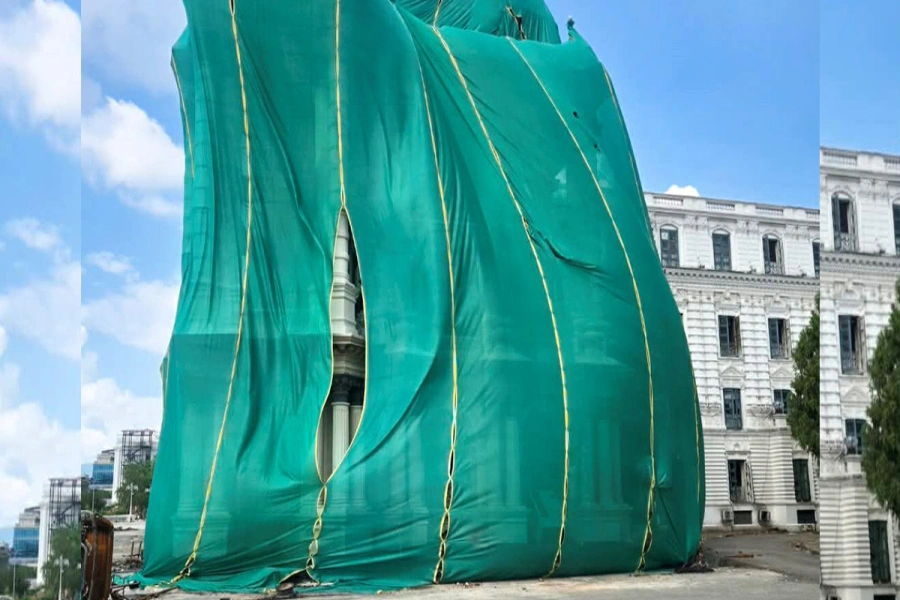KATHMANDU, Feb 27: A majority of Madhes-based political parties have proposed delineating the entire tarai region into two provinces and have demanded that all tarai districts be separated from the hills in the new federal setup.
The Madhesi lawmakers proposing changes in the constitution amendment bill have also demanded that some parts of six tarai districts with Madhesi or Tharu communities be split and only two provinces carved along the Tarai-Madhes region, registering further amendments to the constitution amendment bill on Sunday.
Most of the additional amendment proposals registered by lawmakers from other political parties also have demanded revisions of provincial boundaries. Main opposition CPN-UML, ruling Rastriya Prajatantra Party and some fringe political parties boycotted the amendment process, expressing dissatisfaction with the original amendment bill.
The Madhesi parties have demanded the splitting of Madhesi-majority VDCs and municipalities from Jhapa, Morang and Sunari in Province-1 and Chitwan from Province-3, and the adjustment of the split VDCs and municipalities into Province-2. Likewise, the parties have demanded the splitting of Tharu-majority areas of Kailali and Kanchanpur from Province-7 for adjusting into Province-5.
Civic leaders for addressing Madhes issues before elections

Agitating Madhes-based parties had demanded the splitting of the same districts for the delineation of two provinces in the Tarai-Madhes region even before the promulgation of the new constitution in 2015.
However, the United Democratic Madhesi Front (UDMF) has been divided over registration of further amendments to the constitution amendment bill. The Mahantha Thakur-led Tarai Madhes Democratic Party, Rajendra Mahato-led Shadbhawana Party and Sarad Singh Bhandari-led Rastriya Madhes Samajbadi Party along with three other fringe parties have registered amendment proposals demanding the splitting of six various districts. The parties have demanded that the entire Nawalparasi district be included in Province-5. The existing delineation has placed the western part of the district in Province-5 and the eastern part in Province-4.
However, the largest constituent party in the UDMF, Federal Socialist Forum Nepal (FSFN) led by Upendra Yadav, has refrained from further amendment registrations, along with two other parties. The Mahindra Yadav-led Tarai Madhes Shadbhawana Party and Raj Kishor Yadav-led Madhesi People’s Right Forum-Republic also refrained from registering further amendments.
“We (three parties) decided not to register any amendment as the government doesn’t appear serious about endorsing the amendment bill and our demands cannot be addressed without a separate supplementary amendment proposal,” FSFN leader Shivaji Yadav told Republica.
Yadav, however, claimed that the agitating parties aren’t divided over the amendment proposal. Co-chairman of Shadbhawana Party Laxman Lal Karna claimed that their amendment proposal represents the voice of UDMF. “Now it’s the responsibility of the government to garner a two-third majority to endorse the amendment bill, and we expect it will be passed by parliament along with our further amendments,” he said.
Likewise, the Bijay Gachhedar-led Madhesi People’s Right Forum Democratic (MPRF-D) has demanded an 8th province, splitting Jhapa, Morang, Susari and Udaypur from Province-1 and Saptari from Province-2. The party has also proposed taking Kailali and Kanchanpur from Province-7 to adjust into Province-5.
Meanwhile, some dissident lawmakers from the ruling Nepali Congress (NC) and CPN (Maoist Center) have registered further amendments to the bill demanding not to take out hill districts from Province-5 without the prior consent of the provincial assembly. NC lawmakers Chandra Bhandari, Dhanraj Gurung and Amar Singh Pun and Maoist lawmaker Top Bahadur Rayamajhi have been protesting the constitution amendment bill, which proposes splitting six hill districts from Province-5 to adjust into Province-4.
The lawmakers have stated that provincial boundaries cannot be revised without the prior consent of the provincial assemblies of the respective provinces, in line with Article 274 of the constitution.

































